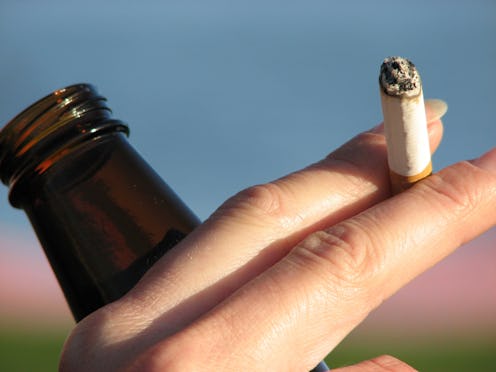Life
How Legal Marijuana Affects Alcohol Use

Though the movement towards legal marijuana is well underway in the United States, our understanding of marijuana and its social and health effects still lag behind our understanding of alcohol. New research sought to clarify how legal marijuana affects alcohol usage, but, unsurprisingly, this interaction is a very complex one. Whether or not further legalization of marijuana succeeds may turn on whether more research can show whether marijuana and alcohol compound each other's ill effects, or whether marijuana replaces alcohol (for the better).
By now, recreational marijuana is legal in four states (while 23 permit medical marijuana usage). This means there are opportunities for "natural experiments" where scientists don't have to set up participants in a lab but can look to the world to see how people are already behaving in different environments. A team of researchers at the University of Washington reviewed over 750 pre-existing studies on marijuana and alcohol, hoping to find evidence as to whether people use alcohol and marijuana as complements (i.e. use them together) or whether one crowds out the other when both are available.
Unfortunately, no clear pattern emerged — it seems, so far, like the way that people choose to use their booze and pot varies widely, according to more specific circumstances. As reported by Science Daily:
One study, for example, found that states where marijuana is decriminalized had more emergency room visits related to marijuana and fewer visits linked to alcohol and other drugs. Some studies found that high school seniors in states where pot was decriminalized tended to drink less, while other research found that college students who used pot also drank more.
Findings around medical marijuana also varied. One study reported that states with medical marijuana dispensaries had higher rates of both marijuana and alcohol use, as well as higher admissions into alcohol treatment facilities. But while states with medical marijuana had fewer alcohol-related fatalities overall, those with dispensaries saw more of those deaths.
Other research found that while legalized medical marijuana wasn't associated with any increases in underage drinking, it was linked with more binge drinking and simultaneous use of pot and alcohol among adults.
It really does make sense that young people who are just trying substances for the first time would want to try both, and that people binging would use more than one substance at one. It also makes sense that more people would end up in the emergency room for marijuana-related problems in states where marijuana is legal (or maybe they're just more honest about what happened).
At the same time, we're far from the normalized environment that marijuana advocates dream of, even if marijuana is technically legal. It still feels more illicit and is less familiar to most adults than alcohol. When weed is legal, adults seem to pick up the habit as a manageable behavior at home more than teens, but we haven't nearly reached the end of that trend yet.
Additional hospital visits attributable to marijuana are concerning, but if they're totally offset by reduced visits from alcohol and other drugs, then that's basically a wash. And drivers under the influence of marijuana are much safer than drunk drivers, meaning this trade-off of legal marijuana could be a good choice in terms of reducing the social impact of drug use on innocent non-users. Since all of this data is still preliminary and not a landslide either way, though, we can expect that the debate over marijuana and its place in a functional, civilized society will continue well into the future.
Images: Sebastian Corneanu/Fotolia; Giphy